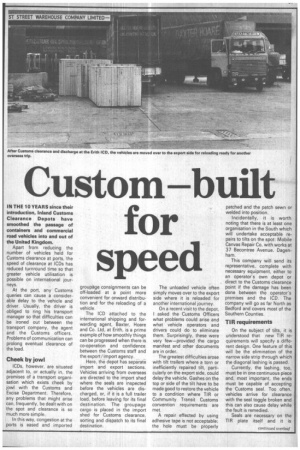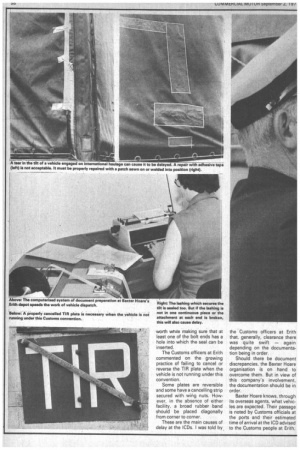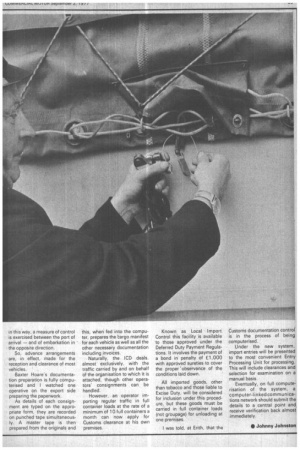Custom built for s eed
Page 59

Page 60

Page 61

If you've noticed an error in this article please click here to report it so we can fix it.
IN THE 10 YEARS since their introduction, Inland Customs Clearance Depots have smoothed the passage of containers and commercial road vehicles into and out of the United Kingdom.
Apart from reducing the number of vehicles held for Customs clearance at ports, the speed of clearance at ICDs has reduced turnround time so that greater vehicle utilisation is possible on international journeys.
At the port, any Customs queries can cause a considerable delay to the vehicle and driver. Usually, the driver is obliged to ring his transport manager so that difficulties can be ironed out between the transport company, the agent and the Customs officers. Problems of communication can prolong eventual clearance of the load.
Cheek by jowl
ICDs, however, are situated adjacent to, or actually in, the premises of a transport organisation which exists cheek by jowl with the Customs and Excise Department. Therefore, any problems that might arise can, frequently, be dealt with on the spot and clearance is so much more simple.
In this way, congestion at the ports is eased and imported groupage consignments can be off-loaded at a point more convenient for onward distribution and for the reloading of a vehicle.
The ICD attached to the international shipping and forwarding agent, Baxter, Hoare and Co. Ltd, at Erith, is a prime example of how smoothly things can be progressed when there is co-operation and confidence between the Customs staff and the export/import agency.
Here, the depot has separate import and export sections. Vehicles arriving from overseas are directed to the import shed where the seals are inspected before the vehicles are discharged, or, if it is a full trailer load, before leaving for its final destination. The groupage cargo is placed in the import shed for Customs clearance, sorting and dispatch to its final destination. The unloaded vehicle often simply moves over to the export side where it is reloaded for another international journey.
On a recent visit to the depot, I asked the Customs Officers what problems could arise and what vehicle operators and drivers could do to eliminate them. Surprisingly, these were very few—provided the cargo manifest and other documents are in order.
The greatest difficulties arose with tilt trailers where a torn or inefficiently repaired tilt, particularly on the export side, could delay the vehicle. Gashes on the top or side of the tilt have to be made good to restore the vehicle to a condition where TIR or Community Transit Customs convention requirements are met.
A repair effected by using adhesive tape is not acceptable; the hole must be properly patched and the patch sewn or welded into position.
Incidentally, it is worth noting that there is at least one organisation in the South which will undertake acceptable repairs to tilts on the spot: Mobile Canvas Repair Co, with works at 37 Becontree Avenue, Dagenham.
This company will send its representative, complete with necessary equipment, either to an operator's own depot or direct to the Customs clearance point if the damage has been done between the operator's premises and the ICD. The company will go as far North as Bedford and covers most of the Southern Counties.
TIR requirements
On the subject of tilts, it is understood that new TIR requirements will specify a different design. One feature of this will be the elimination of the narrow side strip through which the diagonal lashing is passed.
Currently, the lashing, too, must be in one continuous piece and, most important, the ends must be capable of accepting the Customs seal. Too often, vehicles arrive for clearance with the seal toggle broken and this can also cause delay while the fault is remedied.
Seals are necessary on the TIR plate itself and it is worth while making sure that at least one of the bolt ends has a hole into which the seal can be inserted.
The Customs officers at Erith commented on the growing practice of failing to cancel or reverse the TIR plate when the vehicle is not running under this convention.
Some plates are reversible and some have a cancelling strip secured with wing nuts, However, in the absence of either facility, a broad rubber band should be placed diagonally from corner to corner.
These are the main causes of delay at the ICDs. I was told by the Customs officers at Erith that, generally, clearance there was quite swift — again depending on the documentation being in order.
Should there be document discrepancies, the Baxter Hoare organisation is on hand to overcome them. But in view of this company's involvement, the documentation should be in order.
Baxter Hoare knows, through its overseas agents, what vehicles are expected. Their passage is noted by Customs officials at the ports and their estimated time of arrival at the ICD advised to the Customs people at Erith; in this way, a measure of control is exercised between the port of arrival — and of embarkation in the opposite direction.
So, advance arrangements are, in effect, made for the reception and clearance of most vehicles.
Baxter Hoare's documentation preparation is fully computerised and I watched one operative on the export side preparing the paperwork.
As details of each consignment are typed on the appropriate form, they are recorded on punched tape simultaneously. A master tape is then prepared from the originals and this, when fed into the computer, prepares the 'cargo manifest for each vehicle as well as all the other necessary documentation including invoices.
Naturally, the ICD deals. almost exclusively, with the traffic carried by and on behalf of the organisation to which it is attached, though other operators' consignments can be handled.
However, an operator importing regular traffic in full container loads at the rate of a minimum of 10 full containers a month can now apply for Customs clearance at his own premises. Known as Local Import Control this facility is available to those approved under the Deferred Duty Payment Regulations. It [nvolves the payment of a bond in penalty of £1,000 with approved sureties to cover the proper• observance of the conditions laid down.
All imported goods, other than tobacco and those liable to Excise Duty, will be considered for inclusion under this procedure, but these goods must be carried in full container loads (not groupage) for unloading at one premises.
I was told, at Erith, that the Customs documentation control is in the process of being computerised.
Under the new system, import entries will be presented to the most convenient Entry Processing Unit for processing. This will include clearances and selection for examination on a manual basis.
Eventually, on full computerisation of the system, a computer-linked communications network should submit the details to a central point and receive verification back almost immediately.
• Johnny Johnston




































































































































